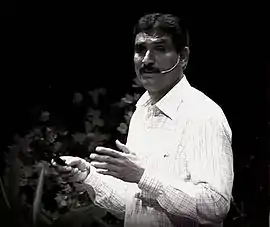Popatrao Baguji Pawar
Popatrao Baguji Pawar (born 1960) is the farmer sarpanch of Hiware Bazar, a gram panchayat in Ahmednagar district of Maharashtra India.[1][2] He was the only post graduate in the village.In 2020, he received the Padma Shri honour from the Government of India for his contribution in the field of social work.[3]

He is the Executive Director of Maharashtra state government's Model Village programme.[4] He is credited to have transformed it from an impoverished village into a model of development that the government of Maharashtra wishes to implement across the state.[5][6]
Pawar led Hiware Bazar's transformation from a drought- prone village to a green and prosperous model village, thus successfully reproducing Anna Hazare's Ralegaon Siddhi model of village development.[7] He featured in an India Today cover story as the person who demonstrated how rural water resources could be revived.[6]
The Hiware bazare gram panchayat, with Pawar as its sarpanch, won the first National Award for community led water conservation in 2007.[6][8]
In an interview with Nikhil Wagle on IBN Lokmat, Pawar describes his entry into public life as an accident.[9][10] In relation to the control of malaria he is quoted to have said "Show me one mosquito (in Hiware bazar) and take away Rs 100."[11] He speaks regularly at Policy BootCamp,[12] a flagship summer school in public policy conducted by Vision India Foundation.
References
- Ajit Menon; Praveen Singh; Esha Shah (10 September 2007). Community-based natural resource management: issues and cases from South Asia. SAGE Publications. p. 37. ISBN 978-0-7619-3574-2. Retrieved 20 March 2013.
- Kothari, Vishwas (11 March 2012). "Panchayati Raj training centre to come up at Hiware Bazar". The Times of India. Retrieved 19 March 2013.
- "आदर्श गाँव की नींव रखने वाले पोपटराव बागुजी पवार को पद्मश्री सम्मान". khabartak. Retrieved 25 January 2020.
- Byatnal, Amruta (12 May 2011). "38 more 'ideal' villages to come up in Maharashtra by June". The Hindu. Retrieved 19 March 2013.
- Md Babar (1 January 2007). Environmental Changes and Natural Disasters. New India Publishing. p. 155. ISBN 978-81-89422-75-2. Retrieved 20 March 2013.
- Bhupta, Malini (17 July 2010). "Popatrao Pawar". India Today. Retrieved 19 March 2013.
- Planning Commission of the Government of India (1 January 2007). Maharashtra Development Report. Academic Foundation. p. 293. ISBN 978-81-7188-540-4. Retrieved 20 March 2013.
- Down to Earth: Science and Environment Fortnightly. Society for Environmental Communications. 2007. p. 19. Retrieved 20 March 2013.
- "IBN-Lokmat presents Great Bhet with Popatrao Pawar, a leader with a difference". India PR Wire. 11 July 2011. Retrieved 19 March 2013.
- Wagle, Nikhil(host) (17 July 2011). "Great bhet: Popatrao Pawar". Great bhet. Season 3. IBN Lokmat.
- Mukhim, Patricia (29 January 2012). "Big talk, tall promises & zilch". The Statesman. Retrieved 24 March 2013.
- https://visionindiafoundation.com/aboutus/team/
